Now, here’s something I know at this point in my life - ‘going back’ is an impossible exercise. Any return to a childhood scene, to a setting pervaded with the joy of some moment of success or romantic love is doomed to disappointment. First - obviously, because of the water in the river never being the same twice and all that. And second – deliberately ‘going back’ is trying too hard for something which, like happiness, depends to a large extent on giving up to sheer accident. On letting go of preconceptions, expectations.
However. Exceptional books prove the exception to this rule. It’s always worth knowing which titles work this way in other peoples’ lives.
‘A Long Way from Verona’ by Jane Gardam is a slim novel I’ve read now many times over the years – in very different circumstances too – as a thirteen year old in northern Ireland, then an undergrad in ‘English lit’, later in Spain, in Paris. And now with a daughter the same age as I was when I first read it. I’ve had this book in several editions bought or borrowed, lost or lent in turn. I’ve never found out there’s a more exact meaning to the title then that I construed in my own reading. ‘Verona’ is an arcardian ideal with Shakespearian overtones. A high literary ideal in contrast with the self-betrayals, the ridiculous blindnesses of ordinary life. Maybe that’s why I like it so much. Not for the ideal but the funniness and pain of the contrasts, the contradictions we have to live with. Like the pastor father of the narrator, a social campaigner and in wartime England who is always gentle in spite of the bitter truths doled out him by the narrator/his adolescent daughter
“ ‘oh stop being such a parson’ I said, ‘stop being so ..pleased when I am difficult so you can be understanding. You’re only thinking of you not me.’
His great big face went quite dead and he sat back. ‘I don’t know what she’s talking about’ he said to Ma.”
Part of the special flavour of this book is how the narrator gets across what it is like to live with your own prickliness for other people. It’s a great source of comedy, and makes the narrator very likeable. Other people are irritating, especially, as she herself says of herself, she's unlikeable because she always has to speak out and tell the truth.
Each time I’ve read ‘A long Way from Verona’ almost at one sitting, with emotion but also pleasure in symmetry - the sort of delight you associate with excellent music where your inner, unconscious ear predicts the cadence before it falls. (this particular joy you don’t get from the re-readings of Dostoevsky’s baggy translations every decade or so). In ‘a Long Way from Verona’ this inner expectancy is satisfied in the plot, the language, and also in how every human trait in the book is balanced by its opposite. For instance a writer called Arnold Hanger visits her school. ‘Down with school!’ English is life!’ he shouts as he is being led away by the headmistress. When I was thirteen it was a phrase I loved in the book and one that got out of my daughter a (short) laugh of approval when I read her the first chapter. (I wanted to read it aloud by the way, because although she is bilingual I thought there were very English tones she might miss..in fact it is a very ‘English’ work. It prones a very Anglo phelgmatic good-heartness in the face of the worst, like the over-worked mother who’s supposed to be batty and loveable shen she boils the fish with the linen on washing day.) The writer – visitor who changes the heroine is one of the book’s many idealists whose lives are pitiful in contrast to what they believe so deeply. This writer reads the main character’s ‘writings’ and changes her life by returning them to her with the message ‘Jessica Vye you are a writer beyond all possible doubt!’ Later, towards the very end of the book there comes a moment, beautifully orchestrated – not a climax, a throwaway moment but also a vital detail, when Jessica has read her way through enough of English literature to know what is genuine. She’s in the house of one of her parents’ friends and picks up a book she sees lying open to find it ‘full of phrases like ‘the pastel twilight’ and ‘the clear and lonely call of the curlew’ then looks at ‘the photo of the author on the front...a pipe stuck out of the side of an awful, honest sort of face. Something about his silhouette reminded me of someone.’ Of course we know what’s coming. She’s an adolescent now, depressed by the nihilism in Hardy’s ‘Jude the Obscure,’ she’s had her first crush (on an upper class boy with communist convictions that fall apart when they are caught in an air-raid together) - but she’s still enough of child to have grown-ups talk over her head,
“ ‘ Still we mustn’t lose heart’,” said Mrs Jamieson brightly, as I turned over the book to see who’d written it.
It was by Arnold Hanger.”
By this stage no comment is necessary to feel the deflation of that moment. In ‘A Long Way from Verona’ we love the characters because they go on anyway, fired by mentors, by ideals that are continually being caught out and disappointed. Occasionally the thirteen year old protagonist brushes up against real, murderous violence. A schoolteacher and fairy godmother figure who understands her completely is killed when the school is destroyed in a blitz. She wanders into a park out of school one day and meets a shellshocked Italian demob wielding a knife but too disturbed to do her any harm. But traumatising violence stays on the edges and is always healthily counterbalanced by the love and wisdom of eccentrics, by an unruffled best friend. Love and luck rule - despite our own endless thorniness with others and despite the inevitable anti-climax of living out your dreams.
Saturday, February 21
Subscribe to:
Post Comments (Atom)







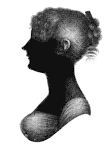

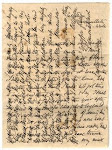
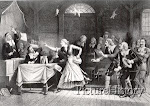













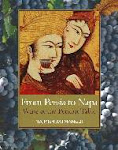






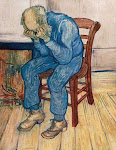



















No comments:
Post a Comment